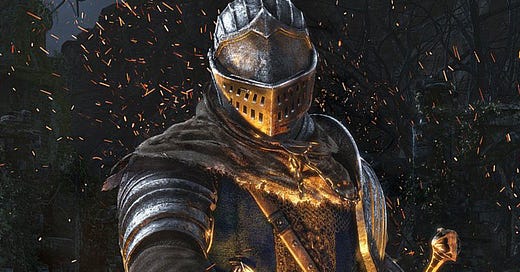For people like me who have spent a good amount of time in old-school gaming circles, there’s an oft-repeated lamentation that younger generations don’t have an interest in the gritty, punishing gameplay style of traditional roleplaying. The gray-hairs all shake their heads and adjust their knee braces while grumbling about how Matt Mercer has led an entire generation of gamers away like a digital Pied Piper. However, there’s a little phenomenon that many a millennial and zoomer have been swept up in over in the medium of video games that includes punishing difficulty, resource management, and a progression system that requires an increase in skill, character level and understanding of the rules from the player in order to see all there is to see. That phenomenon is called Dark Souls and it has sold over 33 million copies across three titles. The company that produced the game, FromSoftware, has also released smash hits Bloodborne, Sekiro: Shadows Die Twice, and Elden Ring which all share the same core ethos. This ethos is perhaps best summarized in a two-word meme; “Git Gud.”
The original Dark Souls game was released in 2011 and it was received warmly by critics and players weary of a video game landscape rife with scripted cinematic events, chest-high walls, and hand-holding early game sections designed to teach you how to play the game. By contrast, Dark Souls throws you into the thick of it with minimal introduction to gameplay elements and even less of an introduction to story. It becomes apparent early on that this game expects you to figure out how to play it rather than teaching you the correct way. Additionally, the story of Dark Souls is primarily told in the background putting the gameplay first. The experience is driven almost entirely by player exploration of the environment from the beginning and only opens up from there. The gritty medieval fantasy aesthetic feels as comfortable as a broken-in pair of boots to a traditional roleplayer and it clearly found an audience immediately. However, as the game became popular and its reputation spread across the internet, it attracted the attention of the same kind of dilettantes who flooded into online D&D communities when Critical Role got popular. As these types tend to do, they quickly began flooding forums with gripes about how difficult and unmerciful the game was with some shrieking about how the game has no difficulty settings. The fan community had a simple response for them; learn how to play the game. This evolved into a simple statement of “Get good,” which evolved into the stylized “Git Gud,” as many memes tend to do over time. The ethos of Dark Souls was firmly established. The game will not change for you. You have to change to beat it.
Dark Souls and the games inspired by it are immensely popular despite having a high skill ceiling and a non-linear story driven by exploration and lore discovery. What’s more, its unforgiving nature is seen as a primary reason for its popularity. If it works for Dark Souls, why not for RPGs? After all, the ethos of the OSR has long revolved around a difficult game where players need to learn to interface with the game in order to be successful. However, the OSR has one major downside that its proponents don’t seem to understand. It ties this gameplay style to a specific time that they are nostalgic for. While there’s nothing inherently wrong with nostalgia, pop culture has been drowning in 80’s nostalgia for the past decade or more. For every cringe “Only 90’s Kids Will Remember…” post that my generational peers make, there are a dozen bloated, over-produced nostalgia bombs from the 1980’s exploding across our screens. The bloom is off the rose and young people are growing increasingly hostile towards the nostalgia of their parents. How do you sell the game if not through the lens of nostalgia though? You sell it like Dark Souls.
The beautiful thing about selling TTRPGs like Dark Souls is that you don’t have to change a thing. Dark Souls and old-school roleplaying are like estranged siblings. All that’s required is emphasizing the style of game over the specific time period that it was released in. It’s a hard-scrabble battle to the top of the mountain. It’s an underdog becoming the champion. It’s a classic and fundamentally human experience that people buy in all sorts of media. In fact, it’s a story ripped straight from classic literature. The 80’s were fun and I’m sure you and your friends had a great time playing D&D together in your parents’ basement after school, but you cannot sell people on nostalgia they don’t have. Instead I offer a tried and tested marketing strategy. This game will knock you on your ass until you learn to dodge the blow and give one back. Overcome the challenge and dominate what was once dominant over you. “Git Gud.”




